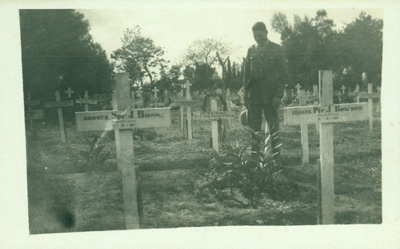'It is a sad thing to think that many of those who once sat near us during interminable lectures, or played beside us on the cricket and football field, men with whom we had formed firm friendships at school before we ever came up to College, should be left forever on a little arid strip of land eight thousand miles away ...'
From an editorial in student magazine The Kiwi on the deaths of their friends and classmates at Gallipoli.The Kiwi, October 1915, 10, 1, p.11.
The Fallen
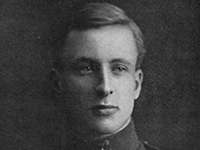 Eric Tayler
Eric Tayler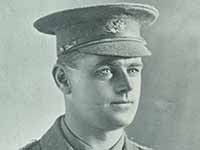 Frederick Stuckey
Frederick Stuckey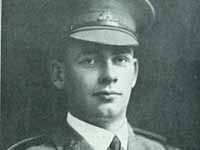 Alan Dawson
Alan Dawson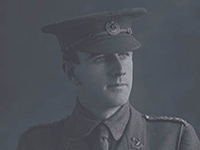 Herbert Richardson
Herbert RichardsonLieutenant Eric Hardwick Tayler was the first Collegian known to have died during the First World War. He died not from gunshot wounds but from double pneumonia at Hazebrouck Base Hospital, France on 9 Feburary 1915. He had been in the trenches for two weeks, serving with the 1st Battalion of the York and Lancaster Regiment.
The campaign on the Gallipoli peninsula in Turkey claimed the next lives, including those of Major Frederick Stuckey, Lieutenant Alan Dawson and Lieutenant Herbert Richardson, who all died on 25 April 1915, the day of the Gallipoli landings.
Major Stuckey, who gained a MA from Auckland University College (AUC) in 1902, was in his mid-30s and working as a teacher at King’s College when he left for war. Second Lieutenant Dawson, aged just 22, had taken law papers at AUC in 1911-1912 and was working as a law clerk when he signed up with the Australian Imperial Force. Twenty-three year old Lieutenant Herbert Richardson was working as an importer after studying as an undergraduate for a few years from 1910.
These young men were among the first of at least 137 Collegians who did not return from the war. The names of all of those who are known to have died are recorded on the In Memoriam page.
Contemporary publications differ on the number of Collegians who fell - from 128 in the now digitised Roll of Honour to 141 in the 1933 AUCSA publication Golden Jubilee (which includes seven men who died between 1920 and 1932). The estimate of 137 wartime deaths is based on information in the Roll, the AUC Calendars for the years 1915 to 1920, The Kiwi magazine, the Online Cenotaph and Golden Jubilee. Including the additional seven men from Golden Jubilee, the death toll climbs to 143. However, during digitisation of the Roll it became apparent that the compilers did not manage to capture all deaths; also some Collegians remain unidentified so there may still be some deaths that are unrecorded.
According to their Cenotaph records, of the 137 men who died in wartime, 64 lost their lives in France, 31 in Belgium, 21 at Gallipoli, Turkey (including some on hospital ships), seven in New Zealand from diseases or wounds, five in England, three in Palestine, three in Egypt, one in Mesopotamia (modern Iraq), one in Germany and one at sea returning to New Zealand.
In his autobiography, Sir Douglas Robb, a surgeon and Chancellor of the University of Auckland, wrote: 'Men of my vintage matured just after the first World War. We had personally missed the experience of fighting, but our immediate seniors who returned were a sadly thinned-out group. Almost a generation of the best young men were wiped out and throughout my life I have been conscious of this deprivation. In all walks of life many of those who would have been leaders were missing.'1
You can read about some of the 'missing' as well as some of those who returned in Their stories.
Jo Birks, Special Collections
- Sir Douglas Robb, Medical Odyssey, Auckland, 1967, pp.18-19.



